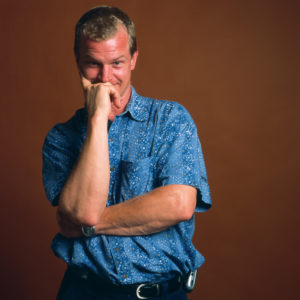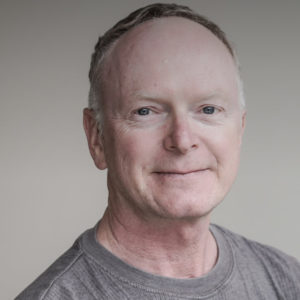
Relationships in the Shadows
Core Dance explores loss in 'As the Shadows Grow Longer' at the MATCH on March 14-16.

Two brothers, three years apart in age, close playmates in games of make-believe, grew up in a small town in Colorado. Decades later, the younger died suddenly from the consequences of an alcoholism that everyone close to him had thought was under control.
This relationship sits at the center of As the Shadows Grow Longer, a new dance work to be presented by Core Dance, March 14–16 at the MATCH (Midtown Arts and Theater Center Houston). D. Patton White, the older brother who choreographed the piece, focused not so much on the shock and grief over the death of his younger brother, Claiborne, but on the relationship they shared.
The Story
That small-town environment, lacking in diversity of any sort, was not kind to any perceived difference. Patton was different—effeminate, bookish, and uninterested in team sports. Not yet able to call himself gay—that would come in college—Patton nonetheless endured teasing and bullying in high school. When Claiborne entered high school, he received some of the same treatment because Patton was his brother. Claiborne was much affected by this.
While still in high school, Claiborne was caught up in the turmoil of his parents’ marriage ending, spilling over into conflict between them and him. He left Colorado and moved in with an aunt and uncle in Texas, where both of his parents had grown up. Claiborne finished high school there, and when his paternal grandfather died, Claiborne moved in with his grandmother, becoming her companion and caretaker. When his grandmother died, Claiborne was left a bit anchorless. “When she died in ’91, I think that was a very traumatic experience for him,” Patton said. “He’d had a purpose in life, and then he didn’t.”
Their father owned a condo in Colorado, and offered it to Claiborne in an effort to give him a home base. That is where Claiborne began his journey into alcoholism and depression. Eventually the drinking became bad enough that their father checked Claiborne into the Betty Ford Clinic.

During all this time, Patton had moved to Atlanta, where he attended Emory University and began his career in dance as a performer, choreographer, and educator. He lived as an openly gay man in supportive communities. The brothers’ childhood bond endured both the geographical distance and the family turmoil.
After his stay at the Betty Ford Clinic, Claiborne returned to Texas to live with their mother, who had returned there herself sometime earlier. Claiborne entered into counseling, where he first admitted that he, like his brother, was gay. For years, Claiborne had lived in oppressive environments where he feared getting treated as he’d seen Patton treated in high school. This had pushed him deeply into the closet and, he felt, contributed to his troubles with alcohol and depression.
Patton, as a big brother and occasional parental figure, said he was surprised by the news. In retrospect, the signs were there—no serious relationship, for example—but Patton felt he’d somehow failed Claiborne. Like many a parent who reacts badly to their children coming out, Patton had his own version of the “Where did I go wrong?” questions.
Claiborne eventually moved to Atlanta, where he developed a long-term relationship with a man who had become the legal guardian of his sister’s children. Patton saw Claiborne happy in a relationship that also allowed him to fulfill a desire to be a parent. One gets the feeling that these were Claiborne’s golden years.
As the kids grew up and their mother reentered the picture, the kids began to drift away and leave the household. This left Claiborne once again without a clear purpose in life. Secretly, Claiborne began drinking again.
Retrospect, again, reveals signs, but Patton says that at that point in their relationship, he was trying to be less of a substitute parent by not monitoring everything his baby brother did. Even their mother, who had moved to Atlanta and was temporarily living with Claiborne while her home was having work done, had missed signs of the drinking. “In terms of his physical change, I could have asked more questions,” Patton said. “Whether he would have felt free to be honest with me, I don’t know.”
Then one July evening in 2016, in a sudden crisis around 10:00 p.m., Claiborne called an ambulance. His liver had been irreparably damaged, and his body started shutting down. By 5:00 p.m. the next day, he was gone.
The Dance

Creating a dance out of the experience was not Patton’s idea.
Enter Jeffrey Clark, Patton’s longtime college friend. He observed Patton’s grieving, and it reminded Clark of his own grief after losing a partner to HIV-related illness. Jeffrey went not to Patton, but to Core Dance co-founder and artistic director Sue Schroeder. He came to her with a piece of music and an idea for exploring such deep loss through dance. Schroeder, in turn, took the idea to Patton and asked him if he’d develop the project.
The music Clark brought—the third movement of Ralph Vaughan Williams’ Symphony No. 5 in D Major—was not to Patton’s usual tastes, but he began working on it with Core’s company of dance artists. Besides the music, he asked them questions like, “Think of a person who has been meaningful in your life. What is a particularly memorable moment with that person?” He asked them to write and draw pictures in response to both the music and his questions, in addition to moving to them. As the company engaged with the emerging stories, Patton began to shape their dance movements until it was crafted into the final choreography.
Patton describes himself as a curator of the dance artists’ movements. “The movement itself is all very much devised by the dancers,” he said. “Coming from their bodies, it lives in their bodies.”
The living aspect is perhaps the most important part of As the Shadows Grow Longer. Talking to Patton, one gets the impression that the show, while rooted in grief and loss, is more about the lives shared—including all of the relationships that the dancers brought with them to the dance studio.
Patton said he hopes the performance conveys a feeling of appreciation for the people in our lives. “Recognize the most important thing in your life is how you are filling it with the various relationships you have, and that they are fragile and will at some point end,” Patton said. “Be there and appreciate them, and [realize] how ephemeral they are.”
What: As the Shadows Grow Longer
When: March 14–16
Where: MATCH, 3400 Main St.
Info: coredance.org
This article appears in the March 2018 edition of OutSmart magazine.











FB Comments